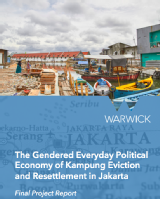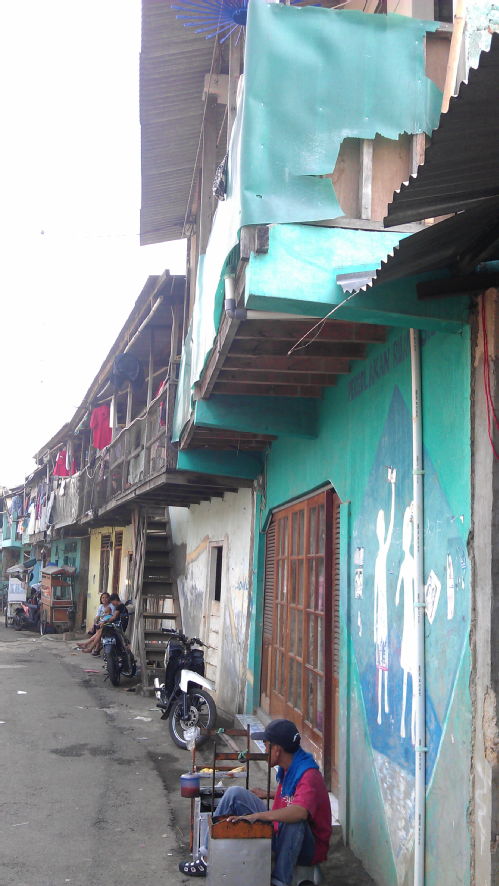Publications and Links
PROJECT OUTPUTS:
Journal Special Issue
A special issue of the Journal Asia Pacific Viewpoint edited by Lisa Tilley, Juanita Elias and Lena Rethel on The Production & Contestation of Exemplary Centres in Southeast Asia has been published in the journal Asia Pacific Viewpoint. This publication was the direct result of a series of conference panels organised for the EUROSEAS conference at the University of Oxford in the summer of 2017. The special issue features a full length article by Tilley, Elias and Rethel based on the Newton/British Council funded research in Jakarta, alongside the work of scholars engaged in debates about the changing nature of cities in Southeast Asia. The special issue also features a forward from leading urban studies scholar Abdin Kusno.
Women's Empowerment Toolkit
The project also sought to develop a Women's Empowerment Toolkit designed to promote an inclusive and participatory approach to urban resettlement schemes impacting the poor. Aimed at practitioners, including urban planners as well as communities affected by resettlement, it provides guidance for incorporating the needs of women into each stage of the resettlement process. The toolkit draws upon some of the findings and reccommendations of the project overall as well as a comprehensive overview of similar development toolkits focussed on issues of gender empowerment, urban resettlement, anti-eviction struggles and participatory development. To read the toolkit please click on this linkLink opens in a new window. To quote from the toolkit:
The world we inhabit has become increasingly urbanised, with a growing proportion of the world’s population residing in towns and cities. Home for many of the urban poor, particularly in the Global South, is often located in informal settlements or slums. With increasing competition for land, poor urban dwellers, often lacking formal rights, face the threat of forced or voluntary eviction. For some, however, initiatives are being introduced aimed at improving living conditions with opportunities for the upgrading of slum areas or resettlement in alternative housing. Whilst there may be many positive outcomes of these initiatives, including material bene ts such as better housing, improved sanitation and access to services, they frequently are planned and implemented with little consideration of the needs and interests of those most affected, especially women, whose experiences and concerns often differ from those of men. This toolkit seeks to help to redress this imbalance by offering practical suggestions for a more inclusive approach that puts women at the centre of all stages of post-eviction resettlement.
The project toolkit has also been translated into Indonesian - here
Final Project Report
The final project report written by the project core team (Dr. Juanita Elias, Dr. Chusnul Mari'yah, Dr. Lena Rethel,Dr.Reni Suwarso and Dr. Lisa Tilley) provides a concise overview of the research conducted with urban poor women in Jakarta. The prohect report situates our study within broader literature on urban poor women and evictions world-wide. The report provides stories and images from across five different research sites in Jakarta, reports on our main project findings and also presents a comprehensive set of policy-reccomendations. We will formally launch the report at the Project Southeast Asia 7th Southeast Asian Studies Symposium in Jakarta 22-24 March. To read the report please click on the image of the report cover below.
To quote from the project report:
Given the high numbers of female-headed households within Jakarta’s kampungs, resettlement involves important gender equality and empowerment issues. Informal kampung economies in which women play prominent roles have facilitated community solidarities and the new housing developments rarely enable women to combine work in the informal economy and their household responsibilities, which can undermine community bonds. In this project, we sought to speak to women impacted by eviction and resettlement. We spoke to women living under the threat of eviction, those who had been evicted but were occupying their former kampung areas, those who were rehoused in public housing blocks known as rusanawa, and those living in alternative self-organised housing cooperatives. Women have experienced eviction and resettlement in very different ways – but all respondents pointed to the many negative economic and social impacts of eviction. In this report, we present these women’s stories, alongside photos that were taken as part of the research process. These stories all point to one key nding: that there has been a failure to think through how resettlement schemes have particular consequences for women’s livelihoods and security. In the final section of the report we have developed a series of recommendations that emerge from this research.
Policy Brief
Project Co-PI Dr Chusnul Mar'iyah of Universitas Indonesia's Centre for Election and Public Policy has written a policy brief that draws upon research conducted by the UI team and their student researchers. The brief provides an analysis of the problems faced by female residents in public housing blocks and suggests that more needs to be done in order to incorporate these women's perspectives into the urban planning process. The brief can be read here.
To quote from the policy brief:
The study’s findings demonstrate that, to date, the local government does not have a strong, comprehensive and integrated strategy for conducting relocation of residents from kampungs to superblocks. The government considers that it has fulfilled its civic obligations by relocating residents to a living place it considers adequate. Little consideration is given to the consequences of resettlement for those relocated which may lead to social, economic, educational, health, cultural implications. For the government relocation has become a merely ‘functional’ administrative activity.
Conference Report published in ASIEN: The German Journal of Contemporary Asia
A report on the project workshop 'Getting Published in The Social Sciences for Early Career Researchers' held at the University of Warwick was published in ASIEN: The German Journal of Contemporary Asia. This report was a reult of a collaboration between authors based at warwick and Univesitas Indonesia and focused on the issues facing Indonesian social scientists seeking to publish their research in English language outputs.
Photo Essay
Lisa Tilley, Juanita Elias and Lena Rethel published a photo essay 'Undoing Ruination in Jakarta: The Gendered Remaking of Life on a Wasted Landscape' in vol. 17, no. 4 of the journal International Feminist Journal of Politics. The essay presents photos and commentary from the Kampung Akuarium site in North Jakarta. Kampung Akuarium (also known as Pasar Ikan) was the site of mass forced evictions and residents have returned to and occupied the site of their former homes. The abstract for this article is as follows:
This intervention shares images and stories from the women evictees in Jakarta who collectively give voice to the psychic, physical, and material injuries inflicted by state dispossession in the city. Engaging Ann Laura Stoler's (2013) language to expose the politics of ruination and preservation, we illustrate the gendered nature of the remaking of life on the most wasted of urban landscapes. The focus of this piece is Kampung Akuarium, a neighborhood violently evicted in April 2016 as part of a broader evictions regime in Jakarta under the governorship of Basuki Tjahaja Purnama, popularly known as Ahok. In the aftermath, Kampung Akuarium became the most restive of Jakarta's landscapes as residents returned to make claims for justice and compensation, and to remake their lives directly on the rubble of their old homes in defiance of the city government. Flanked by the preserved warehouses of the VOC, the ruined neighbourhood ultimately became a site where colonial histories, state- and capital-inflicted expropriation and ruination, and gendered forms of injury and struggle all found material modes of expression alongside one another.
Book chapter
Lisa Tilley's chapter Immanent Politics in the Kampungs: Gendering, Performing, and Mapping the Jakarta Economic SubjectLink opens in a new window has now been published in the volume Women, Urbanization and Sustainability, edited by Anita Lacey (Aukland). Lacey's volume draws together path-breaking research on the gendered urban experience from across the globe and includes chapters on Dar es Salaam, Istanbul, Lima, Cairo, Caracas, Honiara and Port Moresby. Tilley's chapter on Jakarta turns a feminist political ecology lens on urban dispossession in order to demonstrate the gendered nature of evictions and resistance:
In a scenario resembling that within many urban settings across the globe, intensive commercial investment supported by a state evictions regime is rapidly displacing the urban poor from their ‘kampung’ neighbourhoods in Jakarta. This chapter turns a ‘messy’ feminist political ecology lens on the gendered nature of dispossession and resistance in the city in order to draw attention to the ways in which gendered subjectivities and urban space are co-produced in this context. The opening claim here is that evictions are enabled by middle class and elite discourses of exclusion which situate kampung residents outside of the proper figure of the Jakarta economic subject. In light of this observation, the chapter considers some of the ways in which women actively contest these subject prohibitions – from performances which use the kampung ecology itself as stage and backdrop, to the production of maps which situate women’s productive activities within the wider market life of Jakarta. Further analysis centres on how kampung spatiality is related to women’s immanent organisation, mutual aid, and economic activities, such that upon translation to a different spatial setting, such as social housing, these forms of organisation and production are broken down. Mindful of this, kampung women are actively involved in efforts to influence the design of social housing. Through these efforts they hope to shape the productive material context of their existence, to maintain the spatial logics of their support networks, and to claim their position as economic actors and full subjects of Jakarta (Tilley 2017).
LINKS: Wider reading relating to the evictions regime in Jakarta
Report from LBH Lembaga Bantuan Hukum Jakarta (Jakarta Legal Aid Institute) '60% Jakarta evictees not getting health, education aid as promised: StudyLink opens in a new window' December 22, 2016:
The majority of low-cost apartment (rusunawa) residents, who were evicted from their former homes to make way for city development projects, have yet to receive easy access to education and health as promised by the Jakarta administration, the Jakarta Legal Aid Institute (LBH) found in a recent study.
Report in the Sydney Morning Herald 'The real reason many poor Jakartans are opposing Ahok in the gubernatorial electionLink opens in a new window' February 4, 2017:
"We were never told why but Ahok was quoted in the media saying he wanted to turn the area into a religious tourism destination because an old mosque is nearby. He wanted a big square where people can meet in restaurants. Ahok keeps saying he wants to revitalise the old city but nothing has happened since the eviction."


